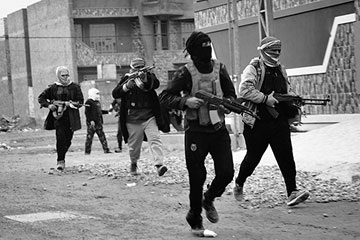
Tribal fighters patrol Fallujah streets on Jan. 5 as the Iraqi government faces off against al-Qaeda forces.
Few Iraqi cities bear in their dust-covered stones the tragic symbolism of America's misbegotten war like Fallujah does. It was there, in March 2004, that angry mobs pulled four Blackwater USA contractors out of their vehicles and hung the bodies of two of them from a bridge over the Euphrates. And it was there, in the months following, that U.S. forces redeemed the possibility of a peaceful Iraq, fighting house to house in a costly but successful effort to make the city safe for handover to Iraqi government forces.
So the pain was anything but symbolic for U.S. veterans of the Iraq War when they learned that the city had fallen again on Jan. 4, not just to armed rebels eager to oust the Baghdad government but to a powerful al-Qaeda affiliate, known as the Islamic State of Iraq and Greater Syria (ISIS), that is among the most feared in the Middle East.
ISIS is a threat well beyond Fallujah, thanks to the leadership of Abu Bakr al-Baghdadi. Though he has shown little appetite to attack the U.S., the represents the kind of Islamic extremist who counterterrorism officials believe may pose the greatest terrorist threat to Americans in the post-bin Laden era.

